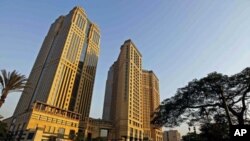As new governments brought to power by the Arab Spring revolts work to deliver economic prosperity to their people, they are looking to Europe as a potential market and aid donor. The continent’s economic troubles could make it more difficult, however, for the Arab governments to reach their goals.
Egypt's popular revolution, and others in Tunisia and Libya, promised democracy and freedom from repression. They also unleashed pent up demands for more prosperity, a goal that depends in large part on international markets and investors.
Risk analyst Anthony Skinner of the Maplecroft company said, "This will have a bearing on how deep their pockets are, or how deeply they actually stick their hands into their pockets, and churn out revenue and aid to these markets, which have suffered a lot of turbulence in Libya, Tunisia and Egypt. So, of course this will have a bearing on the overall ability of such markets to recover."
At the London School of Economics, Professor Iain Begg said Europe’s economic problems will be felt differently in the various Arab Spring countries.
"I think we need to look at the individual countries in the Arab world because they’re very different in their characteristics. Libya is an oil-rich country, and although it will take some time to get the oil revenue flowing again, Libya will benefit from losing its isolation. Much more difficult is Egypt, which is a very populous country, with fewer immediate export potentials," said Begg.
Libyan businessman Salem al-Maiar said demand will be important for Libya, too, particularly as it moves to diversify its oil-dominated economy.
"In the past 40 years the oil was the backbone of the economy, and it’s high time now to think seriously about diversifying and liberalizing the economy," he said. "Tourism... we have five UNESCO heritage sites registered in Libya. It is a beautiful country. You have the sea, the archaeology, the Sahara within 20-25 kilometers from each other."
Tunisia has long taken advantage of its location to earn money from tourism, mainly from Europe. But that was down sharply this year after the first Arab Spring revolt in December and January, and only now is beginning to come back.
Still, the ongoing downturn looms, although Begg said 2011 may prove to have been the worst year of the European economic crisis.
"With very few exceptions, the European countries are expected to grow the rest of this year, and certainly into 2012. So it continues to provide a potential market for the Arab countries. If it were to switch to a significant recession, then I’d start to be worried. But I don’t think it will," said Begg.
Moreover, Anthony Skinner said European investors soon may find the Middle Eastern countries more attractive.
"In terms of transparency, in terms of there being a potential shift towards a more liberal democratic system, all of this, of course, bodes well for the individual countries concerned," said Skinner.
The joy and optimism of the Arab revolutions was bound to be followed by the more sober reality of developing countries in a global economic downturn. Now, experts say, the new Arab governments need to fulfill their political promises, be economically innovative, and hope their key markets and aid donors don’t go broke.




